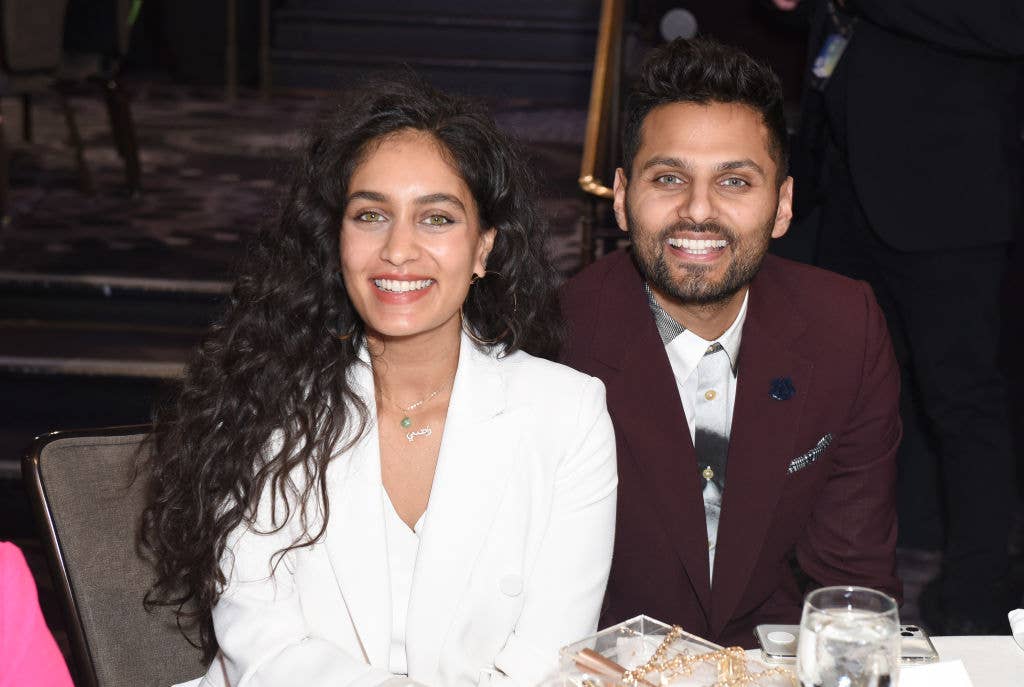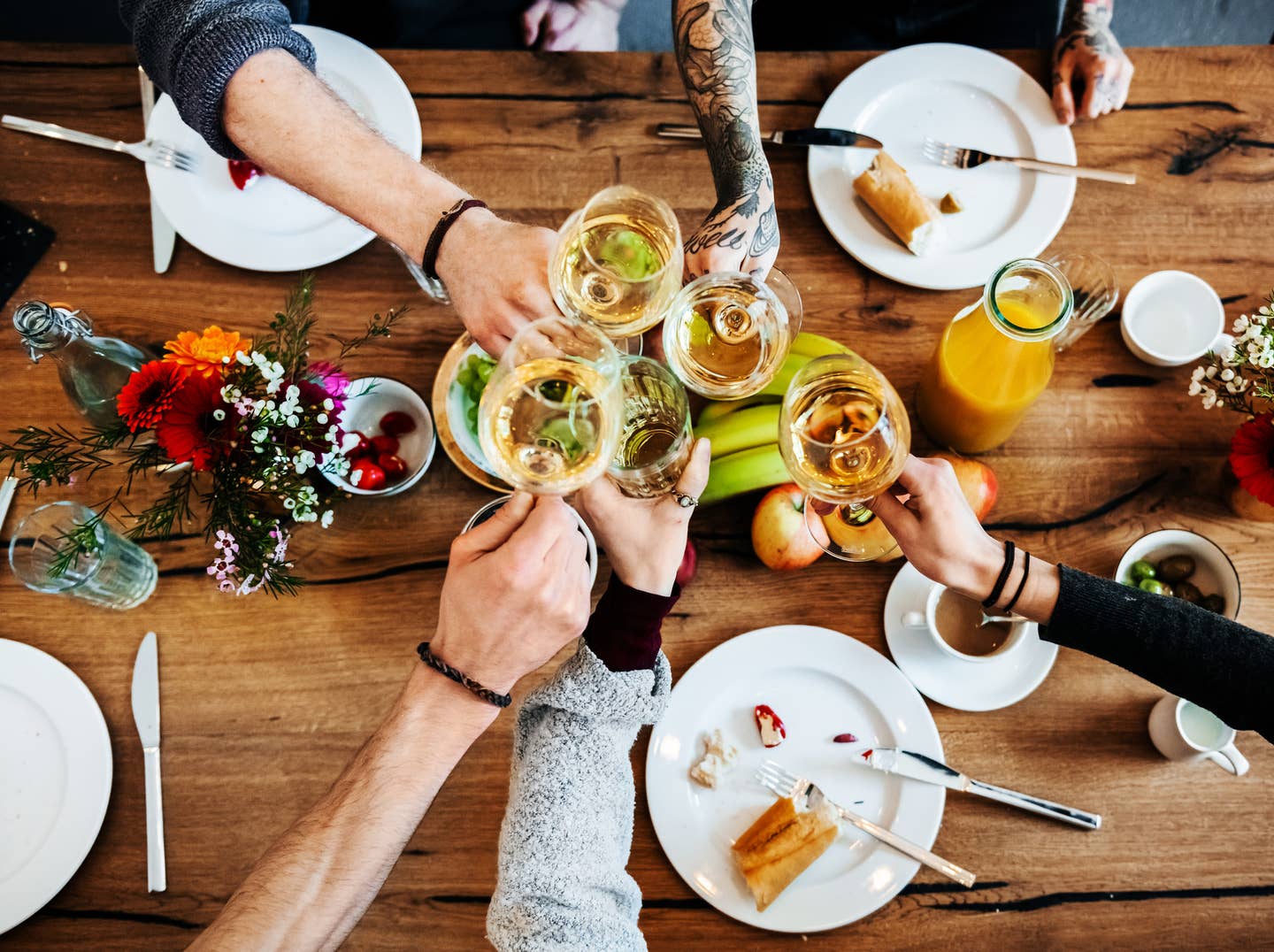
Jay Shetty & Radhi Devlukia-Shetty on How to Hit Pause and Finding Your Purpose
"You are exactly where you're meant to be." These words have comforted me, and no doubt others, ever since I heard Jay Shetty say them, on a zoom call, at the end of an interview about why he has created a new line of tea, called Sama. The comfort is that you don't have to worry about where you're not, or what you're not doing. If you're doing your laundry, then focus on that. If you're running, then allow that to have its own integrity, and when you sit down to work, then let your thoughts fully and successfully engage in the project at hand.
Tea is a way of focusing the mind. "You can't rush tea," Shetty explains, sitting next to his beautiful wife, Radhi Devlukia, an accomplished vegan chef in her own right, and the couple makes an astoundingly effective advertisement for what happens when you act intentionally, approach your day optimistically, and take the time to do something right.
Tea is just the latest launch for Shetty, who finished university and hopped off the expected career track and instead became a monk. He stayed with his monk mentors for three years, learning the value of focus, of breathing to calm and still the mind, and of learning from Sanskrit scroll teachings that had informed many generations of Hindis on how to separate our day to day "noise" from what really matters: finding purpose, doing meaningful work, practicing compassion, and serving others.
Finding purpose is the true work of our lives. Make time for it
Shetty, who has 8.9 million followers, has written Think Like a Monk, which offers valuable lessons on every page, including applying the learnings that he gained while living with monks. But his teachings reach into every corner of wisdom, such as this quote from Charles Horton Cooley (written in 1902): "I am what I think I am, and I am not what you think I am. I am what I think you think I am." He adds: "Let that blow your mind for a moment."
To understand our purpose, we have to slow down and spend time thinking. His tea is designed to do that. Sama comes in four flavors, each with active ingredients, adaptogens, that work in different ways in the body. They are: Protect & Support, Awaken & Energize, Focus & Clarity, and Calm & Relax. The idea is to take a moment to yourself, pour a cup of tea, and allow your body and brain to catch up with each other. Take a breath, a breather, and quiet time and space to understand yourself better and know your "why."
Shetty wants you to leave the monkey brain behind and tap into the monk's brain
His cajoling us all to "think like a monk" really means: Don't let our monkey brains rule the day, going from thing to thing without understanding why. Instead do one thing at a time, with purpose and clarity, and do what is right, for the right reasons. His podcast, "On Purpose" followed the book, and has had 64 million downloads. His goal is to make "wisdom go viral," and if my quoting from the book to my son this morning is any indication, it already has.
Shetty gave up meat and dairy and went vegan when he met Radhi, who grew up vegetarian and went vegan ten years ago. Shetty grew up eating meat, as a youngster in England but used to see the chickens and meat hanging in the window at the butcher's store as he walked home every day. Eventually, this led him to give up meat, but he didn't go fully vegan until he met Radhi. Now he says feels he gets sick less often and feels lighter and calmer than he used to be. Spiritually, he says, it's given him even more appreciation for animals.
Here is our conversation with Jay Shetty and Radhi Devlukia, who we immediately wanted to get to know better. Listen in and you will find her just as wise, soothing, and positive as Jay.
Tea, purpose, plant-based food, and how to feel calmer
Sometimes we think multitasking is getting a lot done, and I'm guilty of this. So, when you explain how the monk's brain focuses and has the integrity of that moment to bring meaning and purpose.
Lucy Danziger: We're superfans, I mean, let's put it this way, we read the book, drank the tea, and we'll have whatever is it that you tell us to do to because when you read the book and understand there's work to be done, you've already done the self work some people never get around to, and it's such an important part of our lives. So, I congratulate you on that.
Jay Shetty: Thank you. There are always new steps, habits, ways, and challenges and I'm so grateful I met incredible mentors during my time as a monk but I'm still trying to do the work, trying my best, and trying to grow.
Lucy Danziger: I think a lot of us have monkey brains and think that multi-tasking is getting a lot done, and I'm guilty of this, I feel like I'm the primary monkey brain. So, when you explain that the monk's brain is focused and has the integrity of that moment and bringing to it meaning and purpose really resonated with me.
Jay Shetty: Thank you and that's fair. What I find incredible is all the research shows that only two percent of the world population can multitask. Researchers say that when we hear that statistic, we think we're in that two percent. It's best for us to recognize that our creativity and productivity actually go up when we single task, so it's actually the opposite of what we believe.
Lucy Danziger: Tell me about your tea.
Radhi Devlukia-Shetty: The Sama is an herbal adaptogenic tea. We've chosen functionality as a predominant feature in the tea and we've actually included ayurvedic adaptogens, plant extracts that help your body adjust to stressors, whether that's physical, mental, or emotional. We have a tea for focus and clarity, that's my absolute favorite one. We got everything from focus and attention to relaxation to energize. People are getting more in tune with their body so it's not about what flavor you want it's about what my body needs right now.
Jay Shetty: Sama means a state of balance, among many other things, and we really believe that after what we've all been going through, the challenges the struggles in the past 18 months, we're really looking for balance in life. Sama is all about helping people create more moments of calm and stillness. You can't drink tea quickly, you inhale the scent, see the colors, and taste the flavors, it's a meditative process and this is an easy way to help people meditate.
Lucy Danziger: I love the fact you don't rush tea time.
Radhi Devlukia-Shetty: I think we should all get back to tea time whether it's having tea with other people like your family and friends or having tea by yourself. We see drinking tea as a moment to bring your presence back to your day. So, whether that's three cups or five cups a day, it allows you to regather yourself, a moment to reflect and slow down. I think it's a practice that needs to be reproduced.
Jay Shetty: I'm an active person so when I take the time to sit down and have my tea, it allows me to recenter, realign, and rebalance myself. We often try to keep going and what happens is, we get weaker and our reliance drops.
Lucy Danziger: In your book, you talk a lot about breathing, and as a monk, it's one of the first lessons you learn. What advice do you have for someone like me who doesn't take a breath all day long?
Jay Shetty: I felt the same way, and I share this story in my book of a young monk who was teaching younger monks how to breathe. He said the reason we teach them how to breathe is that your breath is something that stays with you from the moment you're born to the end of your life and when you experience an emotion your breathe changes so it's interconnected to every emotion.
A simple way to start is diaphragmatic breathing: The easiest way to explain it is when you put your hand on your stomach and when you breathe you really want your stomach to come out and when you breathe out you want to feel your stomach go in. Do that a few moments throughout the day. I may do it before I respond to an email or get in a car. That kind of breathing allows me to be most activated.
Another simple technique is breathing in for more than four counts and breathing out for more than four counts. Before sleep or something, you find never racking, breathe out longer than you would breathe in.
Radhi Devlukia-Shetty: If you know you're going to have a meeting, make sure you take five minutes before doing that breathwork. It's so easy to forget it so it's important to fit it into your schedule.
Lucy Danziger: What do you guys eat in a day?
Radhi Devlukia-Shetty: Well I start my day intermittent fasting, it works well for my body. I stop eating at 7 pm and start at 11 am. The first thing I eat is a plant-based shake with protein and berries because I usually work out first thing in the morning.
Jay Shetty: I start off with a chia seed pudding with blueberries, raspberries, nuts, and seeds every morning.
Radhi Devlukia-Shetty: Chia seeds are so good for the brain because their full of omegas.
For lunch, I usually do a really big salad with every vegetable I have in my fridge with beans and some kind of vegan ricotta cheese. In ayurvedic, when you have a meal you want a balance of all six tastes so when you think about creating a meal you think about getting the salty, sour, pungent, bitter, savory. I really try to balance out those tastes, it's the best way to satisfy your taste buds. For dinner, I love Indian food. I grew up vegetarian so for me, it was the perfect balance of vegetables and nutrients, and my mom was an incredible cook. I usually cook Indian food four times a week. I make lentils, vegetables, and beans. Jay just eats whatever I make.
Lucy Danziger: What did your parents say about becoming a monk?
Jay Shetty: My parents have always been wonderfully supportive and open to my decisions and my desire to do whatever I want. They were very natural about it. My extended community and family found it a lot harder. They said, "you know you'll never get a job again and this is so brainwashing." But, I followed my voice. I learned to hear my own voice and follow it more than the opinions around me and that gave me such a healthy connection about myself. One of the biggest things I learned is what's important to me and what serves my purpose. I switched off the expectations and obligations around me.
Lucy Danziger: I feel a lot of people have a hard time finding purpose, especially young people. How do you help someone find purpose?
Jay Shetty: The way I find purpose is when you use your strengths in the service of others Use what you're good at to help others. If you're a chef and improve people's health and well-being. Find out what you're good at or excited to get better at to develop a skillset. Find a career that helps you learn and grow your strengths. Our purpose also comes through pain. Maybe you lost someone or went through hard times and want to help others. My friend who had cancer now helps people going through a similar experience, Often you discover your purpose through difficulty. Your purpose doesn't have to be a career. It can be what you do on the weekends or on vacation. Take the pressure off, find your strengths, and help people along the way.
Lucy Danziger: If you have a passion for something follow it. When you help someone it gives us a great sense of satisfaction.
Jay Shetty: For sure, and especially when you do it with no expectations. Do it because you feel it's the right thing to do and heal what you struggle with.
Lucy Danziger: Do you have a mantra?
Jay Shetty: The ones I come back to the most often is, I'm exactly where I need to be in this moment and in life. All the power and energy are in the present. My mind is always convincing me that I need to be here, or somewhere else.
Radhi Devlukia-Shetty: When I wake up, the first thing I think about is, today is going to be better than yesterday. For me, it brings a sense of hope and belief. if you don't wake up and believe in the better, the day won't go so well. It allows my mind to shift in a way to be better.
More From The Beet






